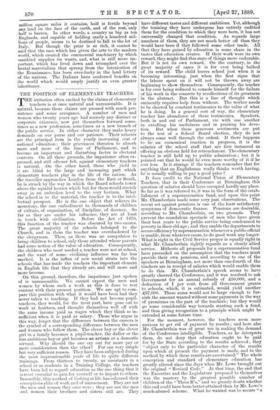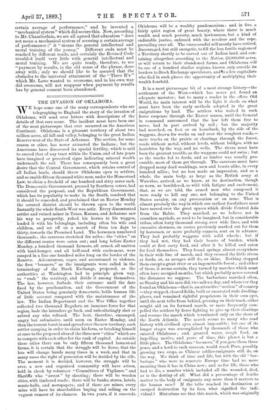THE POSITION OF ELEMENTARY TEAM:IFIRS. T HE irritation often excited by
the claims of elementary teachers is at once natural and unreasonable. It is natural, because these claims are pressed with much per- sistence and some arrogance. A number of men and women who twenty years ago had scarcely any distinct or corporate existence, now put themselves forward some- times as a new profession, sometimes as a new branch of the public service. In either character they make heavy demands on our purse and our patience. Their salaries are the principal item in the yearly increasing cost of national education ; their grievances threaten to absorb more and more of the time of Parliament, and to become an important and disturbing factor in electoral contests. On all these grounds, the impatience often ex- pressed, and still oftener felt, against elementary teachers is natural. On the other hand, those who yield to it are blind to the large and increasing part which elementary teachers play in the life of the nation. As the traveller approaches London from the East or South, he is struck by the way in which the Board schools tower above the squalid houses which but for them would stretch away in an unbroken level to the very horizon. What the school is to the material, the teacher is to the intel- lectual prospect. He is the one object that relieves its monotony, the one embodiment to thousands of children of culture, of organisation, of discipline, of decency. So far as they are under his influence, they are at least in touch with civilisation. Before the Act of 1870, this function of the teacher was obscured by two causes. The great majority of the schools belonged to the Church, and in them the teacher was overshadowed by the clergyman. Then, as there was no compulsion to bring children to school, only those attended whose parents had some notion of the value of education. Consequently, the children who most needed a teacher were not at school, and the want of some civilising influence was far less marked. It is the influx of new social strata into the schools that has made the teachers the important element in English life that they already are, and will more and more become.
On this ground, therefore, the impatience just spoken of is unreasonable. We cannot expect the men and women by whom such a work as this is done to rest content with their present position. We are apt to com- pare this position with what it would have been had they never taken to teaching. If they had not become pupil- teachers, they would, for the most part, have gone out to work at fourteen, and thought themselves well off with the same income paid as wages which they think so in- sufficient when it is paid as salary. Those who argue in this way, forget that the difference between the careers is the symbol of a corresponding difference between the men and women who follow them. The clever boy or the clever girl in a family becomes a pupil-teacher, the duller or the less ambitious boy or girl becomes an artisan or a domestic servant. Why should the one cry out for more pay or more consideration than the other? For one very simple but very sufficient reason. They have been subjected during the most impressionable years of life to quite different trainings. From thirteen to twenty, as assistants in a school or as students in a Training College, the teachers have been led to regard education as the one thing that it is most essential to gain for yourself or to impart to others. Insensibly, this method of looking at life has coloured their conceptions alike of work and of amusement. They are not the men and women they once were ; they are not the men and women their brothers and sisters still are. They have different tastes and different ambitions. Yet, although the training they have undergone has entirely unfitted them for the condition to which they were born, it has not universally changed that condition. As regards large numbers of them, they are not much better off than they would have been if they followed some other trade. All that they have gained by education is some share in the tastes that education creates. If their work were its own reward, they might find this state of things more endurable. But it is not its own reward. On the contrary, in the great majority of cases it is for ever being balked of its reward. The child leaves school just when it is becoming interesting, just when the first signs that the labour spent on it will not be thrown away are beginning to show themselves. Consequently, the teacher is for ever being reduced to console himself for the failure of his work in the concrete by recollections of its greatness in the abstract. But this is a line of thought which eminently requires help from without. The worker needs to be cheered by constant testimonies to the value of what he is doing. In a general sort of way, the elementary teacher has abundance of these testimonies. Speakers, both in and out of Parliament, vie with one another in extolling his usefulness and in praising his devo- tion. But when these generous sentiments are put to the test of a School Board election, they do not always come well through the ordeal. If there happens to be an economical reaction in progress, it is the salaries of the school staff that are first instanced as offering an obvious field for retrenchment. The elementary teacher is still held up to public admiration ; but it is pointed out that he would be even more worthy of it if he cost less. Is it strange if the teachers remember that for anything that an Englishman really thinks worth having, he is usually willing to pay a good price ?
It does credit to the National Union of Elementary Teachers, that in their Conference at Birmingham this question of salaries should have occupied hardly any place. So far as it was referred to, it was in the form of the estab- lishment of a superannuation fund, and upon this point Mr. Chamberlain made some very just observations. The recent set against pensions is one of the least satisfactory symptoms of democratic finance. Pensions are desirable, according to Mr. Chamberlain, on two grounds. They prevent the scandalous spectacle of men who have given their best years to the public service being condemned to poverty in their old age ; and they enable the departments to secure efficiency by superannuation whenever a public official is unable, from whatever cause, to do good work any longer. What is right in the Civil Service proper is equally right in what Mr. Chamberlain rightly regards as a closely allied service. Hitherto all proposals for a superannuation fund have proceeded on the assumption that the teachers must provide their own pensions, and according to one of the speakers at Birmingham, not more than one-fourth of the teachers are in receipt of salaries which would enable them to do this. Mr. Chamberlain's speech seems to have greatly cheered the Conference, and it was resolved to ask Government for an annual subsidy of £50,000, and a deduction of 1 per cent. from all Government grants to schools, which, it is estimated, would yield another £37,000. These sums would not be large enough to fur- nish the amount wanted without some payments in the way of premiums on the part of the teachers ; but they would go some considerable way towards starting such a fund, and thus giving recognition to a principle which might be extended at some future time.
For the moment, however, the teachers seem more anxious to get rid of payment by results ; and here also Mr. Chamberlain was of great use in making the demand of the Conference intelligible. Teachers, as he interprets them, do not deny that education ought to be paid for by the State according to the results achieved ; they "object only to the particular character of the results upon which at present the payment is made, and to the method by which these results are ascertained." The whole conception and standard of elementary education has greatly altered since the days when Mr. Lowe brought out the original " Revised Code." At that time, the end that the Executive and the Legislature proposed to themselves was the mastery by the greatest possible number of children of the " Three R's," and we greatly doubt whether this end could have been better attained than by Mr. Lowe's much-abused scheme. What he wanted was to secure "a certain average of performance," and he invented a "mechanical system" which did secure this. Now, according to Mr. Chamberlain, we are all agreed that education " does not mean a mechanical system of securing a certain average of performance ;" it " means the general intellectual and moral training of the young." Different ends must be reached by different roads, and certainly the Revised Code troubled itself very little with general intellectual and moral training. We are quite ready, therefore, to see "payment by results, in the old sense of the phrase, done away with ; only we should like to be assured that the obstacles to the universal attainment of the " Three R's " which Mr. Lowe wanted to overcome, and in his own way did overcome, will not reappear when payment by results has by general consent been abandoned.



































 Previous page
Previous page